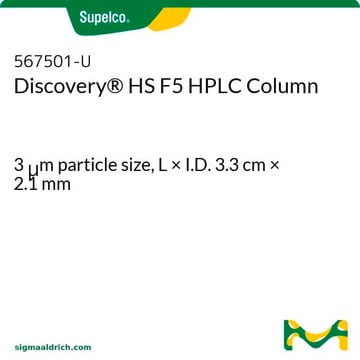567500-U
Discovery® HS F5 (3 µm) HPLC Columns
L × I.D. 5 cm × 2.1 mm, HPLC Column
About This Item
Recommended Products
product name
Discovery® HS F5 HPLC Column, 3 μm particle size, L × I.D. 5 cm × 2.1 mm
material
stainless steel column
Quality Level
Agency
suitable for USP L43
product line
Discovery®
feature
endcapped
manufacturer/tradename
Discovery®
packaging
1 ea of
extent of labeling
12% Carbon loading
parameter
≤70 °C temp. range
400 bar pressure (5801 psi)
technique(s)
HPLC: suitable
LC/MS: suitable
L × I.D.
5 cm × 2.1 mm
surface area
300 m2/g
surface coverage
4 μmol/m2
impurities
<10 ppm metals
matrix
silica gel, high purity, spherical particle platform
fully porous particle
matrix active group
PFP (pentafluorophenyl) phase
particle size
3 μm
pore size
120 Å
operating pH range
2-8
application(s)
food and beverages
separation technique
reversed phase
Looking for similar products? Visit Product Comparison Guide
Related Categories
General description
Generally, bases are retained longer on the HS F5 than on a C18. Increasing the organic content of a C18 separation 5 to 10 percent will generally provide similar retention on an HS F5. Results with other compounds are highly variable. However, it is generally true that solutes with log Po/w values less than 2.5 will be retained longer on HS F5 compared to a C18. The degree of difference is highly solute dependent.
Features and Benefits
- Unique selectivity
- Similar retention to C18 (sometimes requires stronger mobile phase)
- Excellent peak shape
- Stable, low-bleed LC-MS separations
- Scalable separations from 3 to 10μm particle sizes
Legal Information
Application
guard cartridge
Choose from one of the most recent versions:
Already Own This Product?
Find documentation for the products that you have recently purchased in the Document Library.
Chromatograms
application for HPLCOur team of scientists has experience in all areas of research including Life Science, Material Science, Chemical Synthesis, Chromatography, Analytical and many others.
Contact Technical Service





